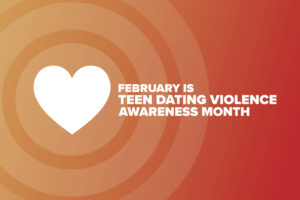 When we think of February, we are surrounded by images of hearts, roses and romantic poetry. However, the month of “Love” is also Teen Dating Violence Awareness month.
When we think of February, we are surrounded by images of hearts, roses and romantic poetry. However, the month of “Love” is also Teen Dating Violence Awareness month.
It can be hard for pre-teens and teens to know when a dating relationship is unhealthy. When does “teenage drama” turn into abuse? Teen dating violence or TDV, is a form of intimate partner violence that is rarely talked about in families. Research has shown that three out of four parents have NOT talked to their children about domestic violence. So let’s start the conversations.
Teen dating violence is defined as the physical, sexual, psychological, emotional abuse, or digital abuse within a dating relationship, and is perpetrated by someone between the ages of 13 and 18.
If you think someone you know is in one of these types of relationships, here are some signs to watch for: excessive jealousy, a constant need to know the whereabouts of their partner and pressure to move the relationship to the next level too quickly, to name a few. They may also show very controlling or explosive behavior, and they may even refuse to let the relationship end. Teenagers are very vulnerable to peer pressure and often do not know how to set healthy boundaries.
Teen dating violence affects millions of teens in the U.S each year and is underreported.
An unhealthy, abusive, or violent relationship can have a lasting effect on a developing teen. For example, victims of TDV are more likely to experience symptoms of depression and anxiety, engage in unhealthy behaviors, such as using tobacco, drugs and alcohol. It is not unusual for them to exhibit antisocial behaviors such as lying, theft, bullying and suicidal ideation. So how do we stop this before it starts?
Teaching our pre-teens and teens about healthy relationships is essential in this fight. Having the difficult conversations at home about respect, boundaries and what happens when those boundaries are crossed is a start. Promoting positive relationship behaviors, like how to manage feelings and how to communicate in a healthy way are skills that teens need to learn. Love and strong attraction come naturally: how to act on them appropriately has to be learned and taught.
The parent role in teen dating violence prevention is simple. Ask the question and start a conversation.
For tips on how to start the conversation, reach out to your Integrated Resilience Office at 86.CVB.IRO@us.af.mil for a copy of our conversation guide for parents.


